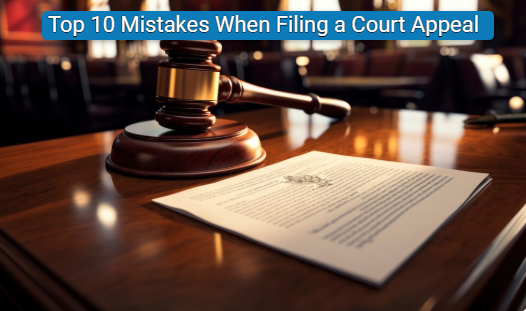Top 10 Mistakes When Filing a Court Appeal

Top 10 Mistakes in Filing an Appeal
What we wish every client knew before trying to fight a denial/decision
Filing an appeal is stressful — no other way to say it. If you’re even thinking about appealing a decision, you’re probably frustrated, disappointed, or even scared. We’ve been there with clients. They walk into our office carrying a ruling they never saw coming, and they want to know what to do next.
“Can I appeal this?”
“How long do I have?”
“Do I even have a chance?”
The truth is, you might. But appeals are tricky. And we’ve seen so many good cases go nowhere because of simple, avoidable mistakes. So we put this together — not to scare you, but to help you avoid the traps that catch so many people off guard.
Whether you’re dealing with an immigration case, a civil court decision, or another legal ruling, here are the top 10 mistakes we see when someone tries filing an appeal in court — and how to avoid them.
1. Not Understanding What a Notice of Appeal Is

Let’s clear this up first.
A notice of appeal is not your full argument. It’s not a second chance to explain yourself. It’s simply the official document that says:
“I intend to appeal this decision.”
That’s it.
We’ve seen people try to write paragraphs explaining the injustice of their case, or mistakenly believe the notice is the appeal. It’s not.
If you’re unfamiliar with what a notice of appeal does, it’s worth getting advice before filing it — because the whole process depends on this first step being executed correctly.
2. Filing It in the Wrong Court
One of the most damaging missteps we’ve seen is when someone files a notice of appeal in district court, thinking that’s the right place, when it should have gone to the appellate court (or vice versa).
Once, we had someone come to us who had mailed their notice to appeal to the wrong address, based on outdated online instructions. The deadline expired before they realized it.
The takeaway? Always confirm where you should be filing the notice of appeal documents. The court system won’t always correct you, and that error can be fatal to your case.
3. Missing the Deadline
We get asked all the time:
“How long do you have to file an appeal?”
In most cases, the answer is: 30 days from the date of the decision. Sometimes even less.
So when someone calls us asking, “Can I file an appeal after 30 days?” — our answer is usually no. By then, it’s too late.
There are rare exceptions for some administrative appeals, but if your clock has already passed 30 days, you’re almost certainly out of time. That’s why we urge clients to move fast, even if they’re unsure they’ll go through with it.
You don’t need to have the entire argument ready — just get that notice of appeal filed in time.
4. Thinking the Appeal Is a Full Do-Over

We’ve had people come in expecting the appellate court will listen to their side of the story from scratch.
That’s not how it works.
Filing an appeal is not asking for a new trial. It’s asking a higher court to review the legal process — not the facts — of the first decision. No new witnesses. No new evidence.
The only question is: Did the lower court apply the law correctly?
Understanding this will shape how you approach your appeal — and whether you have valid legal grounds to file in the first place.
5. Using the Wrong Paperwork
Another very real mistake: filing with the wrong form or forgetting a required detail.
We’ve seen clients submit a notice on appeal that was missing the court name, or that wasn’t signed, or was missing attachments. Even small clerical errors can result in the entire filing being rejected.
If you’re not sure how to file a notice of appeal correctly, or what documents are required, this is where having legal guidance can make all the difference.
6. Forgetting the Filing Fee
Each court has its own rules, but most appeals require a filing fee paid at the time you file the notice of appeal. If you miss it, your case might not be accepted at all.
Some people don’t realize they need to include it. Others hope they can pay later. And a few just forget.
If you can’t afford the fee, most courts have a waiver process — but you still need to request that before the deadline.
7. Not Notifying the Other Party

It’s called service of process, and it’s not optional.
Once you file your notice of appeal, you’re usually required to send a copy to the other party and confirm with the court that you did. If this step is missed or done improperly, the appeal could be thrown out.
In immigration cases, this might mean serving the Department of Homeland Security or the government’s legal counsel.
8. Filing Without a Real Legal Strategy
Here’s something that happens more than you’d think: someone rushes to file an appeal just to meet the deadline, but then realizes they don’t know what they’re arguing.
Or worse, they discover there was no real legal mistake in the first decision — just an outcome they didn’t like.
That’s why we always advise: don’t just file a notice of appeal out of panic. Talk with someone first. Understand your chances. Get clear on the legal basis for your appeal.
A strong appeal starts with a smart strategy, not just a strong opinion.
9. Waiving Your Right to Appeal Without Realizing It
Yes, this can happen — and it happens a lot.
In some hearings or plea deals, people agree to certain outcomes, not realizing that they’re also waiving their right to appeal as part of the deal.
We’ve reviewed court records where the last paragraph says, “Respondent voluntarily waives further appeal,” and the person didn’t even know they had said yes to that.
Always check the fine print. And if you’re unsure, ask before you sign.
10. Trying to Do It All Alone

We get it. Lawyers cost money. But filing an appeal in court is not something we recommend doing solo, not unless you’re very familiar with legal procedures and deadlines.
We’ve had people come to us after trying to handle things by themselves. By the time we saw the case, it was often too late to fix things. Wrong court, expired deadline, poor legal reasoning.
Sometimes, the worst part is that they could have won if the appeal had been filed correctly.
If you’re serious about your case, at least talk to a lawyer for an hour. Know your options. Know your risk. Don’t wing it.
Thinking About Appealing?
Whether you’re challenging an immigration ruling, a civil judgment, or another decision, at Passage Immigration Law, we can help you file your notice of appeal correctly and give you honest advice about what to expect next.
Consult us today and let’s get your appeal off on the right foot — and protect your chance to be heard.
Disclaimer: This article offers general legal information, not legal advice. Do not rely upon this information without seeking legal counsel. If you need legal advice, you may contact us directly to speak with an attorney. We disclaim all liability with respect to actions taken based on any information presented. Every case is different, and outcomes will vary depending on the unique facts and legal issues of your case.
